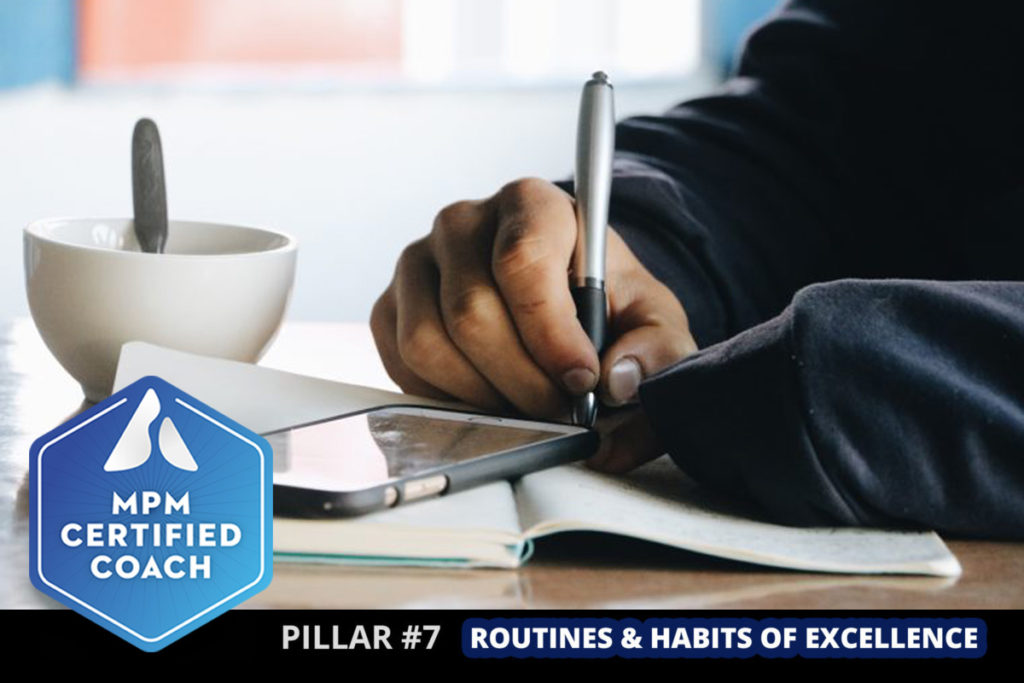
Get this FREE MiniCourse to learn the systems and secrets I use to help world-class athlete's perform at an elite level.
If you’re like most of the coaches, athletes, and professionals I work with, every day is a battle…
A battle to get all you need to get done.
A battle to balance work with finding time for other things important to you: family, friends, your health.
A battle to find and sustain the motivation to stay focused and do things that you quite frankly don’t want to do.
And a battle to figure out how the heck to come back tomorrow and do things just a little bit better.
It can feel like once you leave the house you enter a gunfight with all that you have going on in a day. The stress of school, work, and family demands can mount up quickly.
This stress will affect every aspect of your day, from the energy and focus you bring to workouts and practice/competition, to your ability to maintain high levels of self-discipline to stay the course to achieve your goals.
There is a way to combat this stress and to create the structure needed to be more focused, efficient, and productive—an “antidote to chaos”, so to speak.
Morning and evening are the times of the day you typically have the most control over, providing a great opportunity to insert routines that will help you focus, reflect, and plan for success to combat some of the stress you face each day.
A crucial skill for long-term health and fitness success and optimal performance is being able to both plan for success each day, competition, etc., and then reflect on performance to recognize what we did well and what needs improvement.
When you do this consistently, you’ll see all kinds of positive turnaround in your ability to build new habits, stay positive, and continue progressing towards the best version of yourself.
WHEN—AND HOW—TO USE MORNING AND EVENING ROUTINES
Having a morning and evening routine is something that is beneficial for everyone.
As a coach, think about how you can apply this yourself, as well as how you can help your athletes implement this into their daily routine.
If you’re an athlete, building in a consistent morning and evening routine—as we’ll cover here in just a second—is absolutely crucial.
From a practical standpoint, one of the key benefits provided through starting and ending each day with a routine is creating the space needed for planning and reflection.
Bookending your day for success by having a morning and evening routine is one of the most simple and effective ways to bring consistency to your days.
The first rule for implementation? Don’t overcomplicate things. The idea behind a morning and evening routine is simple in theory:
- Use the a.m. routine to plan and prepare for success, focus, and set the tone for the rest of the day.
- Use the p.m. routine to reflect on the day, recognizing areas of success and areas where improvement is warranted and do anything necessary to set yourself up for success the next day.
What exactly you do during your morning and evening routine will depend on your specific situation, goals, and the status of your mental performance training plan.
The morning and evening routines are a perfect time to include some of your mental performance work such as reading, meditation, mental imagery, scheduling, and reflection.
There really isn’t a “right” or “wrong” answer in terms of what to include in the morning and evening routines. However, there are some tips for success that can serve as “best practices” for implementing effective morning and evening routines.
Following that, I’ve provided a few examples so you can get a more concrete idea of what this looks like in practice.
TIPS FOR SUCCESS (4 WAYS TO ACTUALLY MAKE YOUR MORNING AND EVENING ROUTINE HABIT STICK)
Most people know implementing a morning and evening routine will be beneficial… yet most people still aren’t doing it.
Why? Because starting—and sticking with—new habits is hard. If following through with new habits is an area where you struggle, it doesn’t make you a “bad” or “weak” person.
It just makes you human.
Everyone has a tough time creating new habits (like morning and evening routines), often resulting in the guilt that comes from struggling to do one more thing you know you should be doing.
The good news is, there are some steps you can take to increase the chances that you’ll actually stick with your new habit of starting and ending your day with a routine.
Tip #1: Leverage “habit stacking.”
Habit stacking is simply using existing habits as triggers, or reminders, to build new habits on top of.
You have some type of morning and evening “routine”, whether you realize it or not. Modifying an existing routine is far more effective than trying to build entirely new routines from scratch. Simply write down what you do the first 5-30 minutes of your day currently, starting from the moment you wake up. Then do same the thing for the 5-30 minutes before bed.
From there, look for “triggers” you can utilize to insert new, positive behaviors/habits to begin building a positive routine. For example, let’s say you currently wake up and the first you do is walk to the kitchen to turn the coffee maker on or start making breakfast. You could then review your 168 for the day, listen to a success hotline podcast, read The Daily Stoic, or do some good visualization of your day.
This is utilizing a habit that’s already ingrained (turning on the coffee maker or going to the fridge) as a trigger to add a new action to your routine.
This is just one example, but leveraging this concept of “habit stacking” will 10x your ability to build new practices into your morning and evening routines.
Tip #2: Start small.
Building new routines is hard. Habit stacking, as outlined above, will help, but many people still tend to get overwhelmed. We have a tendency to try and take on too much at once. Maybe we are able to stick to a new routine for a few weeks, only to regress back to our old ways.
To help combat this tendency and create the opportunity for long-term consistency, it’s important to start small. It’s tempting to try an overhaul everything at once, but patience is key.
Taking more time to implement small changes that are able to be followed consistently long-term will always outperform big changes that are only followed for a short time.
Remember: Slow and steady wins the race. To start, identify just ONE thing to add to the morning and evening routine. Once you’ve done that consistently for a few weeks, add in another new habit.
Continue building until you have a morning and evening routine that is a good balance between effective and doable long term.
Tip #3: Individualize.
It can be tempting to look at the routines of a successful business executive or athlete and aim to emulate what they do, but a big part of great mental performance coaching is individualizing routines to each client and athlete, based on their goals and needs.
As mentioned above, morning and evening routines are an excellent opportunity for you to go to work on yourself. Create your routine so that it’s specific for you and aligns with your personal goals.
Tip #4: Write it down.
Some people prefer storing things like this in their mind, viewing the act of writing things out as an “unnecessary hassle.” But writing out routines is beneficial.
When something is written down, it improves clarity and adds in an extra layer of accountability, so you can review routines without any confusion about what was supposed to happen.
Plus, research shows we retain things better if we write them down, so make sure you write out your routines!

A.M. AND P.M. ROUTINE EXAMPLES
I’ve provided a sample morning and evening routine below to provide a visual of what this could look like in practice.
Sample Morning/Evening Routine:
A.M. Routine:
- (Alarm going off as the trigger): 5 minutes of 6-2-8 meditation.
- (Starting coffee maker as the trigger): Get pre-made lunch and snacks for the day out of the fridge and put into a cooler/bag to take with them to school.
- (While drinking coffee and eating breakfast as the trigger): Review “168 + MVP Process”, envisioning situations/challenges that may arise throughout the day and how you will overcome them to stick to your plan for success.
P.M. Routine
- (Alarm set for 30 minutes before “lights out” as the trigger): Review/plan meals for the next day and separate foods for meals/snacks into individual containers so they’re ready to go tomorrow morning.
- (Brushing teeth as the trigger): Review 168 for tomorrow, pack school bags and lay out clothes for tomorrow. Review my daily checklist for success written/taped on the mirror to identify what you did well, and if any items were not “checked off”, identifying why not and what you can do differently tomorrow to get it done.
- (Sitting in bed right before lights out as the trigger): Review your “mission statement” as a daily reminder of what your goals are and why those goals are important to you.
These are simple habits and routines that take very little time, but just think of the positive impact this would have if followed consistently.
That’s the power of a well-designed morning (A.M.) and evening (P.M.) routine!
As you take the next steps to begin implement what you’ve learned today with yourself and those you coach, a few things to remember:
- Use the a.m. routine to plan and prepare for success, focus, and set the tone for the rest of the day.
- Use the p.m. routine to reflect on the day, recognizing areas of success and areas where improvement is warranted and do anything necessary to set yourself up for success the next day.
- Keep in mind the four tips for success (leverage habit stacking, start small, individualize, and write it down).
YOUR NEXT MOVE: IF YOU WANT TO TAKE YOUR COACHING TO THE NEXT LEVEL, YOU NEED TO MASTER THE MENTAL SIDE OF PERFORMANCE
Knowing the what, when, and how of coaching mental performance—and trying to fit all of the pieces together on your own—can be burdensome.
That’s why I created the Mental Performance Mastery (MPM) Certification. Inside the MPM Certification, I’ll teach everything you need to add this crucial skill set to your coaching toolbox.
You will learn how to help your athletes and clients overcome mental barriers that trip them up and build the habits, mindset, and behaviors they need to be at their best when it matters most.
Not only will you develop a deep knowledge of the ten most valuable mental skills needed for peak mental performance, but you’ll also have a proven method for consistently and predictably developing these skills in those you coach.
The MPM Certification will open to new students for a limited time only twice a year (May and November). Join the free Insider’s List below to save $200 on the certification and be the first to know when it goes live.


